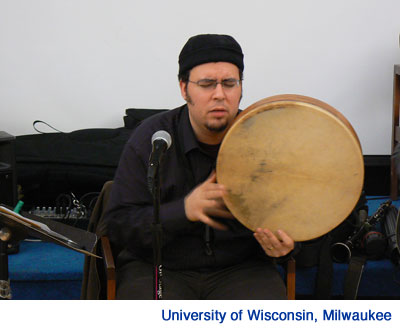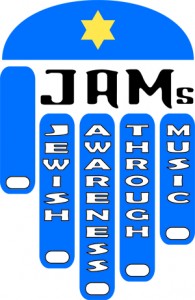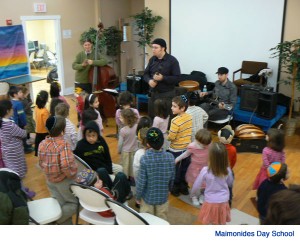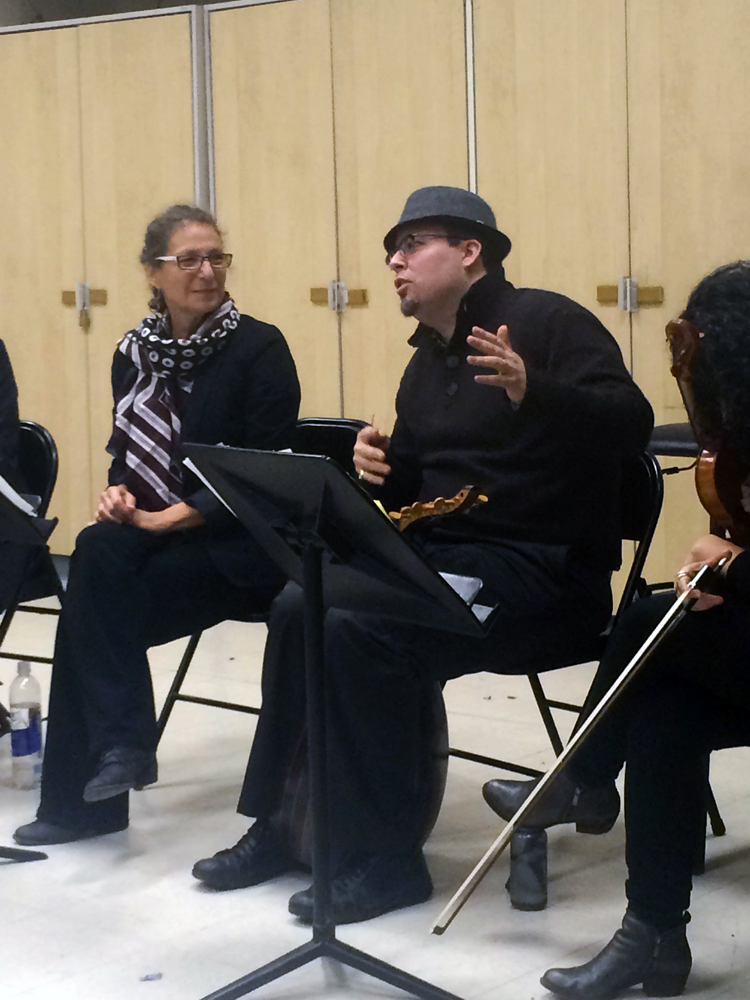Programming
Workshops and special programs on Mediterranean musical cultures, Muslim-Jewish intercultural exchange, Jewish musical traditions, Sephardi-Mizrahi history, culture, and thought, and jazz and global jazz traditions, led by artist-scholar Dr. Samuel Torjman Thomas. Samuel is a professor of ethnomusicology & Sephardi studies, and a multi-instrumentalist (woodwinds, oud, vocals, percussion). All programming is customized to your community’s interests and budget.
To learn more:
Educational Programming
/Sample Programs
Sephardi-Mizrahi Journeys in Music and Culture: A performance talk (musical lecture and discussion) on the Jewish experience in North Africa and the Middle East, this program travels a super highway of musical traditions, highlighting instances of Muslim-Jewish intercultural exchange, musical dialects, and textual traditions in Hebrew, Arabic, and Ladino.
Performing Piyyutim Workshops: These workshop options explorethe rich and varied traditions of writing and performing piyyutim (semi-sacred poetry) in the Sephardi-Mizrahi world. This robust realm of spiritual expression serves as the backbone of the quasi-classical musical traditions of several Sephardi-Mizrahi groups from around the world. Beginning in Medieval al-Andalus (southern Spain) and continuing in the five centuries since the expulsion from Spain in 1492, poets and musicians have been using these piyyutim to express unique conceptions of the relationship between humanity and the Divine.
Performing Piyyutim (one-hour workshop): This workshop is designed to give an introduction to the piyyutim traditions of the Sephardi-Mizrahi world. This workshop includes a short historical contextualization of the field, including highlighting significant composers and poetic methods. Two piyyutim from different times and places are then performed together, learned from rote. Interweaved in this learning process is some textual and musical analysis.
Performing Piyyutim (three-session workshop): This multisession workshop is designed to expand upon the one-hour workshop model, to allow for a deeper exploration into the subject. Different approaches in piyyutim composition, from literary themes to poetic methods, are explored in the context of several works by prominent composers. Included in this workshop is the learning of a variety of piyyutim for the purpose of incorporating musical piyyutim performance into your community. Thus, the piyyutim emphasized are part of life-cycle events, Shabbat and festivals, and possible additions to liturgy.
JAMs (Jewish Awareness through Music)

 JAMs offers exciting programming formats for all communities, including a performance talk/lecture, masterclasses, learning series, multimedia presentations, retreats and Shabbaton experiences, and concerts. Please take a moment to look through the different formats below.
JAMs offers exciting programming formats for all communities, including a performance talk/lecture, masterclasses, learning series, multimedia presentations, retreats and Shabbaton experiences, and concerts. Please take a moment to look through the different formats below.
What makes JAMs so unique? The exploration of Jewish history and culture through the lens of Jewish music.
Programming Titles: Worldwind tour of Jewish history, The Sephardic Table, Sounds of Shabbat, Golden Age Hebrew Poets and Poetics, the dawning of the “American Jew,” Muslim-Jewish Musical Cultures.
JAMs Programming is for all age groups, denominations, and for Jewish and non-Jewish audiences alike seeking to deepen awareness and understanding of Jewish history and culture.
Programming Ideas
Multimedia Workshop: By combining a multimedia presentation with live musical examples, you get a snappy, fast-paced, and exciting experience! While images flash on the screen accompanied by music both live and recorded, the audience is fully engaged in the subject matter. There is also emphasis on interactivity which is great for teen and college audiences.
MJM Workshop: The “Makin’ Jewish Music” workshop is an Interactive program featuring different songs from around the Jewish world. This is especially engaging for youth audiences. Participants will sing and play percussion instruments along with Mizrahi, Sephardic, and Ashkenazi Jewish melodies. By contributing to makin’ Jewish music, participants experience a direct link to our history. The Neshama (soul) comes alive!
MJM Clinic: This workshop is suitable for the more astute musical audience. The “Makin Jewish Music” clinic focuses on analyses of Jewish folk and liturgical musics. Areas of exploration include: Nusach, rhythmic and harmonic elements, music of Temple times, Israeli folk, and contemporary music incorporating “Jewish” influence. Though musical background is helpful, it is not required.

Worldwind tour of Jewish history through music: Starting from the Temple, we will take a wild ride through the vast geographic landscape of world Jewry, looking at various instruments and talking about various references to music in Judaism.
The Sephardic Table: Many mealtime songs come from the great poets of Medieval Spain. This workshop explores the Hebrew text of a few select favorites, contextualizing the poet and the poetry, while also learning to perform a popular Sephardic melodies. Everyone wants to sing a song at the Shabbat table!
Golden Age Hebrew Poets and Poetics: Through the piyyut or highly-crafted Hebrew poem, Sephardic Golden Age poets such as Dunash ben Labrat, Shlomo ibn Gabirol, and Yehuda Halevy were cultivating a distinctive Arab Jewish identity and reflecting Andalusian philosophical traditions.
Covenant: Wedding music and traditions from the Jewish world. Understand how music is a key component in elevating our spiritual level at any simcha (joyous event). Explore how Jews have been getting married since the time of Yakov up until now in places like Poland, Casablanca, Baghdad, and how Jews are getting married in Israel today.
Music and Torah: An in-depth exploration of music references in Kabbalah, Midrash, Tanakh, and from various Rebbeim. We can understand the spiritual side of Judaism through its music. Learn why almost 10% of the population of Ancient Israel were employed as professional musicians. In fact, more musicians were employed by the state than Kohanim (priests)!
Sounds of Shabbat: This program is a delightful journey through the Jewish Sabbath cycle. Utilzing music programmatically, a plethora of Jewish musical traditions is tapped as the soundscape for the “Sounds of Shabbat.” Starting with the onset of the evening, carrying forth to the daytime and family meal songs, this program concludes with an in-depth look at the havdala ritual, separating the holiness of the Shabbat from the mundane quality of the week. This is a favorite program for interfaith activity and co-sponsorship between communities!
When Shlomo Carlebach met Bob Dylan: This program focuses on comparing and contrasting these two Jewish singer/songwriters, exploring Jewish identity through listening and exegesis of musical examples in an interactive discussion with students.
Niggunim (Praying Melody): This program explores the Ḥasidic tradition of wordless melodies. With a foundation in Lurianic Kabbalah, Ḥasidism sought to bring mysticism to the forefront of Jewish practice. Niggunim serve as an important vehicle for democratizing the spiritual experience, essentially promoting access to the highest levels of spiritual awareness amongst the entire stratum of Jewish society. And while we’re learning about the tradition, let’s sing a few!!
Deep Song: The Roots of Klezmer and Klezmerica: This acoustic performance workshop features Samuel on clarinet, combining an exploration of the instruments and aspects of Klezmer with the performance of several pieces from different Klezmer repertoires.
Shabbaton Packages
JAMs programming includes this option for communities seeking the intensive Shabbat experience. Melodies, tropes, and stories from around the world, as well as a spirited guest lecture on Jewish musical traditions come together in the synagogue setting.
For more information on Shabbaton packages, please click here
Audio Clips
- The Jewish Museum, NY -- Moroccan Cha'abi Rhythm Dr. Samuel Torjman Thomas 6:08
- Sounds of Shabbat -- Interfaith Concert and Workshop 1:13
- WNYC NPR Radio -- Leonard Lopate Show Segment WNYC, New York Public Radio 2:55
- Brooklyn Historical Society 2008 - Arab Music in Brooklyn 9:25
Testimonials
The Jewish Museum engaged Sam Thomas to discuss and present Moroccan Jewish music styles for its one-day seminar, Travel U: The Jews of Morocco. Prior to the performance, Sam explained the history of Shirat Ala Music and provided thorough handouts – very helpful take aways.
I was especially impressed with his patience in answering questions from the group — he has great people skills! The performance was delightful and I highly recommend him for events to adults and children. My only regret…we wish we had made more time to a lot for his performance!
Marcia Miller, Director of Membership, The Jewish Museum, NYThank you for coming to present your research and perform repertoire connected to Moroccan Jewish music in North Africa and throughout the global diaspora. The wealth of information you presented strongly resonated with the audience, allowing for a multitude of transcultural connections to emerge.
Dr. Francesco Spagnolo, Director, Magnes Museum, UC-BerkeleyDr. Samuel Torjman Thomas came to our community as a weekend scholar-in-residence. He led services, instantly clicked with local musicians, and provided a spiritual, uplifting, and very educational evening. He is a topnotch musician and historian and he consistently added so much to our community throughout the weekend, not only with his talent and knowledge, but also with the strongest of charisma. His presentations are of the highest quality and very accessible.
Cantor Ben Rosner, Mosaic Law Congregation (Conservative), SacramentoWe had a wonderful Shabbat dinner together, and Dr. Torjman Thomas was a big help in welcoming new arrivals to the Hillel house. The evening included stories and niggunim around the dinner table, musical Torah thoughts, and lively discussion. We rounded out the night with a mighty dessert and lots of singing!
Janice Gold, Hillel Director, University of MilwaukeeSamuel led Friday night and Saturday services, interjecting melodies from different Sephardi-Mizrahi traditions. Friday night included a short talk highlighting the Jewish experience in medieval Spanish society. During Saturday’s luncheon, Samuel led a piyyutim workshop, introducing many poems and melodies to the community. The Shabbaton was capped with a Saturday night concert featuring the full band and a big public audience.
Cantor Mike Weiss, Brotherhood Synagogue, ManhattanSamuel Torjman Thomas brought his skilled ensemble to PS 372, where he brought Arabic music to life for our grade 3 students studying Egypt. It was wonderful to see and hear, to experience, the rich musical traditions of the Egyptian people and to learn more about Egyptian culture.
Sandi Stratton-Gonzalez, PS372, BrooklynSam discussed with our students Jewish migration and immigration, all the while inserting musical interludes of klezmer, niggunim, or Ladino. The kids were entranced and forgot that in addition to being entertained they were also learning Jewish history!
Les Krevsky, Education Director, Union Temple (Reform), BrooklynCongregation Beth Shalom in Modesto, Ca just hired Sam to do an adult education program as well as a children’s program this past weekend. He was fantastic!!! The adult program was thought provocating, spiritual, meditative, entertaining & educational. The children’s program was filled with interactive music from around the world. The kids and their parents loved Sam’s style & knowledge of the musical Jewish world! Thank you Sam!
Marlene Gonsalves, Program Director and parent, Congregation Beth Shalom (Conservative), ModestoI am co-director of the religious school of Congregation B’nai Israel. Samuel came to our school to do a music program for our students in our Monday afternoon Hebrew school. His program was exciting and the enjoyed participating with him. He has a nice way with children; he is able to draw them in and spark their interest and curiosity.
Marilyn Reinman, Co-Director of Religious School, Congregation B'nai Israel, Albuquerque, New Mexico

